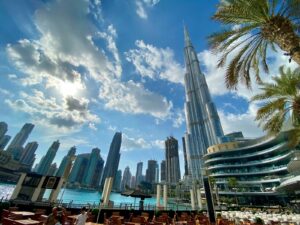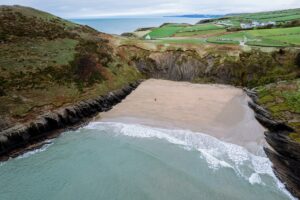Bluestone National Park Resort invites sharing biodiversity best practice, as monitoring at the holiday village shows its air quality is among the cleanest in the UK

Today, early indications of monitoring at the site of Bluestone National Park Resort show air quality at the holiday village in Pembrokeshire is on par with a monitor in its hometown of Narberth; one of sixteen used by the UK Government in rural locations as a baseline for the cleanest air in the UK. The five star holiday resort now invites public and private landowners across the UK and internationally to model its operation as a blueprint for improving biodiversity, as part of the solution in tackling the present nature and climate emergencies.
Professor Paul Lewis is the chief scientific officer at environmental data company Health and Wellbeing 360, overseeing the air quality monitoring at Bluestone National Park Resort; commenting: “The monitoring being undertaken at Bluestone measures the concentration of tiny particles in the air known as PM2.5 from the likes of tiny specks of dust to pollen. Of the annual average PM2.5 measured over the last year across the sixteen government monitoring sites, Narberth, Bluestone’s hometown, comes fifth, highlighting the better air quality in the area compared to many other parts of the UK. We started monitoring the air quality at Bluestone in August 2024 and look forward to benchmarking its average figure in the scheme of this league table in twelve months’ time.”
Bluestone has a range of ESG initiatives which support social, economic and ecological resilience. The resort, located within Pembrokeshire Coast National Park, recognises the opportunity for biodiverse ecosystems to be created in otherwise barren land across the UK and beyond through the sharing of its operational blueprint. Having regenerated dairy farmland which was once an ecological desert into a tapestry of thriving nature reserve environments, its proven model is unique to other village holiday resorts which, conversely, build upon existing areas of beauty and then seek to sustain them.
Environmental scientist, Marten Lewis, led The Darwin Centre in Pembrokeshire before joining Bluestone National Park Resort to implement its founder William McNamara’s biodiversity visions. Marten Lewis said, “We hear a lot about carbon reduction in the race to net zero and less about the importance of biodiversity but the two are inextricably linked. Our model of increasing biodiversity means the landholding is set to sequester, or capture, around 1591 tonnes of carbon over 30 years, over what the dairy farm it replaced would have done.”
Marten continues: “The Adonis Blue Environmental Wildlife Trust Consultancy estimated that Bluestone’s site and its plans to further protect and transform its significant habitat and green space to a biodiverse rich mosaic of grassland, woodland and hedgerows could achieve more than a 50% net gain in biodiversity managed for future generations. In doing this, Bluestone is creating a natural area connecting habitat and species enhancing the national park. If our model were to be adopted by a public or county owned entity the profits could be used for further regeneration. We’re hoping to inspire landowners to follow suit using Bluestone as the blueprint. A biodiversity net gain of 50 percent is five times the ten percent introduced in February 2024 as required of most new developments in England.”
Marten concludes: “Sustainability is increasingly important for consumers when booking a no-fly break. Mintel’s 2024 data shows travellers increasingly favour convenience and responsible environmental credentials while booking a holiday, and six in ten prioritise sustainability as a critical factor in their decision-making process. In keeping with this it follows that more people will start to visit national parks, areas of natural beauty and other beautiful parts of our island. Our blueprint can help local authorities and their respective communities to regenerate the land, regulate visitors and direct them to the places they would prefer them to be in terms of footfall.”
Among its ESG initiatives Bluestone National Park Resort has a five hectare 3.2MW solar farm positioned on historic silage pasture, has fully transitioned to BioLPG, provides electric buggies for guests, is electrifying its fleet of cars and vans, and uses Hydrotreated Vegetable Oil to fuel its tractors, supporting carbon reduction while driving business growth. More than 850 people are employed by the resort which generates over £10m worth of business for suppliers in Wales each year. Neighbouring businesses are supported through life cycle assessments relating to carbon reduction; and local communities benefit from the business’s charitable fund through three streams of funding spanning mental wellness and environmental projects. Since 2018 Bluestone has reduced its carbon emissions from purchased energy by over 90%; it was the first business in the world to recycle nappies and use these in road surfaces on its site, has planted over 60 acres of native woodland, and attained the international Green Key award in recognition of its environmental standards.
Find out more about how people and the planet are authentically at the heart of Bluestone National Park Resort and book a stay at bluestonewales.com/.
Sources:
- Biodiversity Net Gain https://www.gov.uk/guidance/understanding-biodiversity-net-gain
- ‘UK Sustainability in Travel Market Report 2024’ by Mintel.





